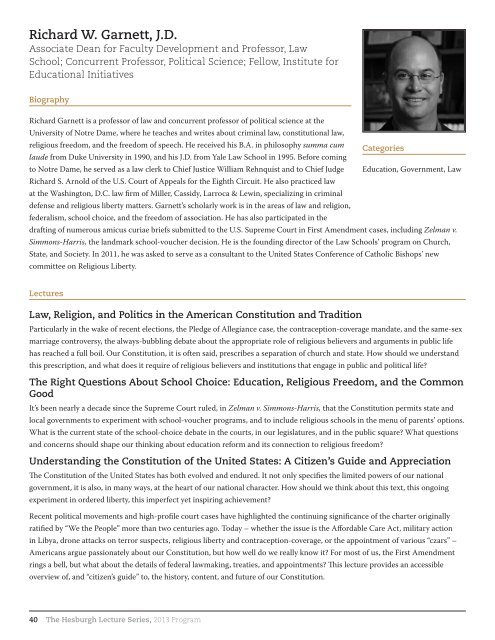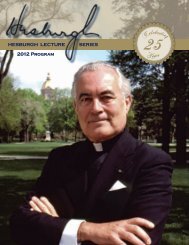HESBURGH LECTURE SERIES 2013 Program - Alumni Association ...
HESBURGH LECTURE SERIES 2013 Program - Alumni Association ...
HESBURGH LECTURE SERIES 2013 Program - Alumni Association ...
Create successful ePaper yourself
Turn your PDF publications into a flip-book with our unique Google optimized e-Paper software.
Richard W. Garnett, J.D.<br />
Associate Dean for Faculty Development and Professor, Law<br />
School; Concurrent Professor, Political Science; Fellow, Institute for<br />
Educational Initiatives<br />
Biography<br />
Richard Garnett is a professor of law and concurrent professor of political science at the<br />
University of Notre Dame, where he teaches and writes about criminal law, constitutional law,<br />
religious freedom, and the freedom of speech. He received his B.A. in philosophy summa cum<br />
Categories<br />
laude from Duke University in 1990, and his J.D. from Yale Law School in 1995. Before coming<br />
to Notre Dame, he served as a law clerk to Chief Justice William Rehnquist and to Chief Judge Education, Government, Law<br />
Richard S. Arnold of the U.S. Court of Appeals for the Eighth Circuit. He also practiced law<br />
at the Washington, D.C. law firm of Miller, Cassidy, Larroca & Lewin, specializing in criminal<br />
defense and religious liberty matters. Garnett’s scholarly work is in the areas of law and religion,<br />
federalism, school choice, and the freedom of association. He has also participated in the<br />
drafting of numerous amicus curiae briefs submitted to the U.S. Supreme Court in First Amendment cases, including Zelman v.<br />
Simmons-Harris, the landmark school-voucher decision. He is the founding director of the Law Schools’ program on Church,<br />
State, and Society. In 2011, he was asked to serve as a consultant to the United States Conference of Catholic Bishops’ new<br />
committee on Religious Liberty.<br />
Lectures<br />
Law, Religion, and Politics in the American Constitution and Tradition<br />
Particularly in the wake of recent elections, the Pledge of Allegiance case, the contraception-coverage mandate, and the same-sex<br />
marriage controversy, the always-bubbling debate about the appropriate role of religious believers and arguments in public life<br />
has reached a full boil. Our Constitution, it is often said, prescribes a separation of church and state. How should we understand<br />
this prescription, and what does it require of religious believers and institutions that engage in public and political life?<br />
The Right Questions About School Choice: Education, Religious Freedom, and the Common<br />
Good<br />
It’s been nearly a decade since the Supreme Court ruled, in Zelman v. Simmons-Harris, that the Constitution permits state and<br />
local governments to experiment with school-voucher programs, and to include religious schools in the menu of parents’ options.<br />
What is the current state of the school-choice debate in the courts, in our legislatures, and in the public square? What questions<br />
and concerns should shape our thinking about education reform and its connection to religious freedom?<br />
Understanding the Constitution of the United States: A Citizen’s Guide and Appreciation<br />
The Constitution of the United States has both evolved and endured. It not only specifies the limited powers of our national<br />
government, it is also, in many ways, at the heart of our national character. How should we think about this text, this ongoing<br />
experiment in ordered liberty, this imperfect yet inspiring achievement?<br />
Recent political movements and high-profile court cases have highlighted the continuing significance of the charter originally<br />
ratified by “We the People” more than two centuries ago. Today – whether the issue is the Affordable Care Act, military action<br />
in Libya, drone attacks on terror suspects, religious liberty and contraception-coverage, or the appointment of various “czars” –<br />
Americans argue passionately about our Constitution, but how well do we really know it? For most of us, the First Amendment<br />
rings a bell, but what about the details of federal lawmaking, treaties, and appointments? This lecture provides an accessible<br />
overview of, and “citizen’s guide” to, the history, content, and future of our Constitution.<br />
40 The Hesburgh Lecture Series, <strong>2013</strong> <strong>Program</strong>



